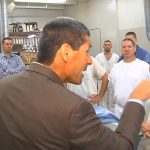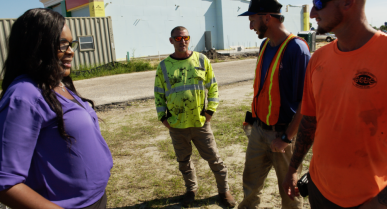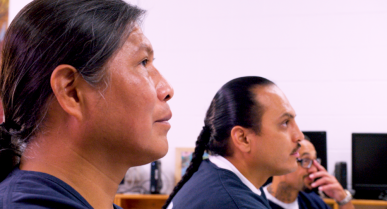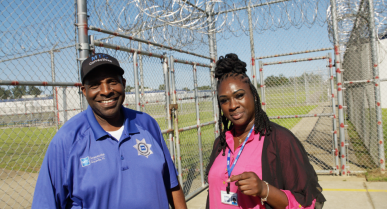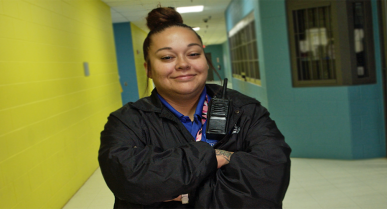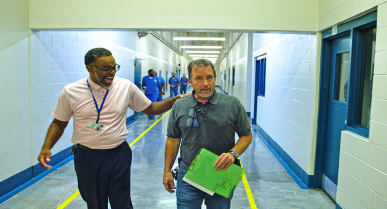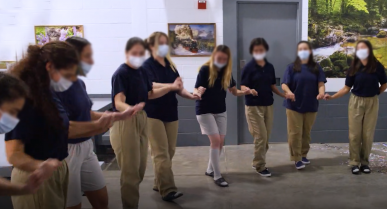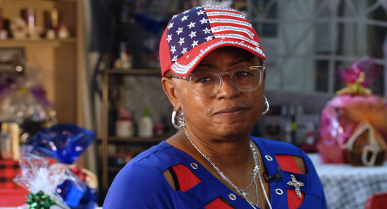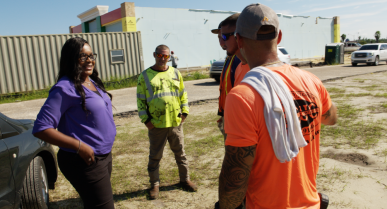Prison Professors Visit MTC Facilities with Powerful Message of Hope and Change
Michael Santos, a successful businessman, and Shon Hopwood, an attorney and law professor shared powerful and poignant messages with men and women serving time in Texas prisons.
Speaking about how much luck plays a role in rehabilitation, Michael says,
“Luck has nothing to do with it. Luck has nothing to do with it. It’s the decisions that you make every single day while you’re here that is going to put you on a path to success or create stumbling blocks.”
Michael and Shon are part of a company called Prison Professors. Their goal: to improve the criminal justice system and to make sure these men and women never come back to prison.
“We strive to help people so when they’re spinning out of control and they’re living at the worst moment of their lives—see hope that they can become something more and help them realize that they have the power within to make those changes today,” Michael adds.
Shon goes on to explain.
“We come in. We like to talk to guys in prison and just explain: if you use your time wisely and make tough choices to change yourself—people see that and when you get out, there will be opportunities for you.”
Prison contractor Management & Training Corporation or MTC invited the men to tour three of its facilities in Texas: the Kyle Correctional Center, Lockhart Correctional Facility, and Sanders Estes Unit.
Warden Deanna Branham welcomed the visitors to the Kyle facility.
“So, what this is, this is called the SOD office, the staff on duty. This is the hub of the treatment side of the house.”
Michael immediately approached one of the incarcerated men who work in the SOD office.
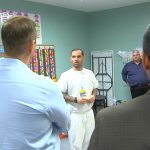 “What’s your name?” Michael asked. “My name is Tim Trahan,” responded Tim.
“What’s your name?” Michael asked. “My name is Tim Trahan,” responded Tim.
Michael continued, “Why should I hire you?”
Tim responded, “Why should you hire me? Because I’m willing to hold other peers accountable as well as myself.”
Michael put Tim Trahan in the hot seat—or as the facility calls it, hot feet—and asked him to explain why he would be a value to an employer and how he’s improved his life while incarcerated at the Kyle facility.
Tim was ready with this response:
“Being here, being held accountable. Before I got here, I wasn’t capable of holding a normal conversation with another human being without getting angry. And this has taught me to take a look at myself. It’s taught me to look at me and realize who I am.”
With a big smile, Michael responded, “Good. You’ve got the job.”
Michael was very impressed with the opportunities given to the men at the Kyle facility.
“The programs that you guys are using here are phenomenal, because those are the real type of programs that you need to do. You need to think. You need to be able to have your statement down about why you can add value, what value you can bring to an employer. You’ve got to have a list of credentials behind you. So, the more you think about it, the better you become. And the better you become, all of a sudden, your time in prison can effectively be an asset. I know how to overcome struggle and obstacles, and that’s why I bring value to this company.”
Michael and Shon toured the MTC facilities visiting with several groups of men and women, sharing messages of hope and outlining what it takes to make it in society after release. Shon shared:
“I would encourage you to take advantage of everything you possibly could while you’re in here. That means everything you read, have a purpose behind it. Don’t just read novels for fun. Read something that’s going to educate you. Because guess what? Education is the great equalizer.”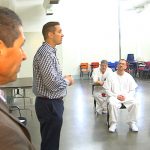
And unlike most visitors—Shon and Michael have a unique connection with each of the men and women they visited.
“So, I certainly know what it’s like to live without hope,” Michael shared. “But there is hope.”
You see, Michael and Shon were both incarcerated at one point in their lives. Michael was convicted of multiple drug crimes and spent 26 years in prison.
“When I went to prison,” says Michael, “the only thing I wanted to do was to get out of jail. I had never been locked up before. I was 23. I was facing life without parole.”
Shon was convicted of five armed bank robberies and spent more than a decade in prison. “That’s what I did,” says Shon speaking to a women incarcerated at the Lockhart facility. “I did 11 years in federal prison.”
Their journeys to success are filled with both extreme joys and great sorrows.
“Ask my wife about the first year out of prison,” says Shon. “It wasn’t easy, especially for her. I had issues. I had to let that stuff go.”
Michael talks about the attitude he had to have in prison to succeed.
“Everything that came out of my mouth, everything that went in my head, everything that I said, did, and thought had to be in harmony with me saying, ‘I never want to come back to prison.”
Michael was released four years ago. Shon got out in 2009. Their stories are inspirational. For each, it began with a decision in prison to make the most of every single minute. They were driven. They were goal oriented and nothing was stopping them.
“You’ve got to visualize success, put a plan in place, put priorities in place, and then execute the plan,” explained Michael to a group of incarcerated men.
While in prison, Michael began reading books. Philosophy caught his attention.
“I was in prison facing life without parole, and I read the story of Socrates. And that story is what changed my mindset. It helped me stop thinking about the problems that I’m struggling with right now, problems that were created because of my own bad decisions, and instead start thinking about solutions.”
Michael read more than 1,000 books in prison and get this…he wrote a book report for each one outlining why he chose the book, what he learned, and how the information could lead to his success.
“When I went to prison and I was sitting in that jail cell, not any different from any of these,” Michael explained. “The Federal Bureau of Prisons, most of it was in prison cells like these. I would sit and say what can I do right now with the resources that I have that will open opportunities for me. And that changed the way I would think. If you can change the way you think, you can open new opportunities.”
While incarcerated, Michael got married, authored multiple books, and developed valuable relationships with people on the outside. Today, he holds a Ph.D., owns several business, speaks at various events across the country, and is a true success story.
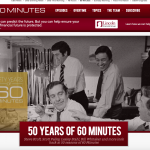 Shon has been featured on 60 Minutes, in the New York Times, and is in talks with Sony to tell his life story on TV or the big screen. Shon spends a lot time on Capitol Hill urging lawmakers to improve the criminal justice system.
Shon has been featured on 60 Minutes, in the New York Times, and is in talks with Sony to tell his life story on TV or the big screen. Shon spends a lot time on Capitol Hill urging lawmakers to improve the criminal justice system.
“Just in the last three weeks, I’ve been up to Capitol Hill and spoke with four different senator offices and was in the White House twice.”
Shon’s story is also extraordinary. A short time after being incarcerated, Shon decided to take a job in the law library.
“For the first six months in the law library,” Shon says, “all I did was check out books and read novels. The law books were big, they were thick, and they were intimidating. When I actually did pull one off the shelf, it felt like it was written in a different language.”
But that didn’t stop him. He eventually began reading those law books, hundreds of them. And when he learned about a Supreme Court case that could reduce his and other’s sentence—he wrote a brief arguing why the Justices should support the case. Shon slowly plucked his thoughts on a typewriter and mailed his brief in. He chuckles as he recounts what happened next.
“A couple of weeks later the courts sent it back and basically said, ‘Mr. Hopwood, it would really behoove you to file this brief in the right court. So, that was the start of my legal career.”
The Supreme Court voted unanimously in support of the case, and that was Shon’s catapult to a new life.
“And then I started just going crazy. I read as much law as I could. I ended up winning another Supreme Court case for another prisoner and winning cases all over the country.”
Today, Shon is a professor of law at Georgetown University. He’s also a successful attorney and motivational speaker.
He and Michael want to see real changes in the U.S. criminal justice system, and they say MTC’s facilities are a great example of how prisons can play a key role in the rehabilitation process.
“And we will talk about how programs like MTC, that allows us to come in here, can move the needle and change outcomes,” says Michael.
Shon also praised MTC’s commitment to truly helping the men and women in their care.
“The things that have surprised me about MTC prisons are, maybe for some of you this is the only prison you’ve ever come to, but I can tell you that I have been to prisons all over the country, and very rarely do I walk into prisons like that have the opportunities that you guys are given.”
Shon and Michael are committed to helping incarcerated men and women realize that they can have the same success, if only they work hard and do the right things in prison.
“When we try to change the law,” says Michael, “we need to demonstrate that people in prison can go back to society, function in careers, build lives as meaningful citizens, and stay out of this system.”
Michael and Shon’s success did not come easily, and that’s one of the reasons they connect so well with these men and women. Michael continues.
“Sometimes it’s easy to lose hope in here. And we want to come back in and let people see. We want you to see what is the best possible outcome—like Shon’s a professor of law at Georgetown, and who would think that’s possible.”
Shon experienced great disappointment after release, but that only motivated him to work harder.
“I’ve had hundreds of lawyers tell me that I would never go to law school and I’d never become a lawyer. And you know, joke’s on them, joke’s on them.”
The men and women they visited were truly moved by their message:
Jesse Berry Jr./Sanders Estes Unit
“They are inspiring, because out of everything they went through, they had the right mind frame and knew that the people that they once were, they’re not anymore. And it’s just inspiring to know that you can overcome any obstacle. The only thing you have to do is want it.”
Marcile Richardson/Lockhart Correctional Facility
“I think some people do get hopeless on the inside. So, I think it’s awesome what they’re doing.”
Matthew Voyles/Kyle Correctional Center
“I think that just them coming, it means a lot. It shows that someone getting out of prison can change their life. And it’s an inspiration to everybody in here.”
Koryne Rodriguez/Lockhart Correctional Facility
“Those men inspired me, because I have been locked up for almost eight years. And I have times where I wonder where I could go with my life and how I can get there.”
Shon says he enjoys every opportunity to speak to incarcerated men and women.
“I just feel like now that I’m on the outside and things have gone so well for me, that this is my opportunity to give back.”
Michael knows change is possible.
“Look, I am living proof of what you can become.”
He told one group,“There’s nothing you can’t do. There’s nothing you can’t do. Do not allow these walls to constrict your mind or your spirit, because God has blessed you with that.”
About Gregory S. Coleman Unit
Gregory S. Coleman Unit is accredited by the American Correctional Association achieving over 99% compliance for both mandatory and non-mandatory standards in its most recent audit. Other accreditations and certifications include the Correctional Education Association and the Prison Rape Elimination Act (PREA).

